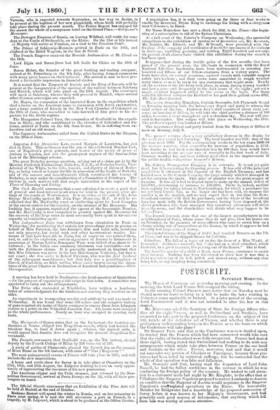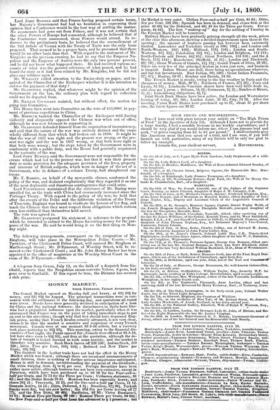POSTSCRIPT.
SATURDAY M Grua rm.
In the evening, Colonel FRENCH gave notice that on Tuesday next he should move for leave to bring in a bill to make tho laws relating to Volunteer corps applicable to Ireland. At a later period of the evening, Lord PALMERSTON said it was not intended to alter the law in this respect.
Mr. KINCIAKE asked the Secretary of State for Foreign Affairs whe- ther all the eight Powers, as well as Switzerland and Sardinia, have consented to take part in the proposed Conference on the subject of the 92d Article of the definitive act of Vienna, and whether there is any preliminary understanding between tho Powers as to the basis on which the Conference will take place ?
Sir ROBERT PEEL said that as the Conference was now decided upon, he trusted that the Powers which had been summoned would take care that the rights of Switzerland were fully recognized. France had denied those rights, having stated that Switzerland had nothing to do with any arrangements which might take place between France on the one hand and Sardinia on the other. France, moreover, had said that it would not surrender any portion of Chablais or Faucignay, because those pro- vinces had been ceded by universal suffrage, but he contended that the whole of that operation was false and fallacious.
Mr. OSBORNE said that, having read the despatches of Lord John Russell, he had the fullest confidence in the manner in which he was conducting the foreign policy of the country. lie wished to call atten- tion to a statement made last night by Mr. Kinglake, to the effect that at Villafranca the Emperor Napoleon proposed to restore Lombardy to Austria on condition that the Emperor of Austria would acquiesce in the Emperor Napoleon's eonftnaplated operations on the Rhine. The honourable Member for Bridgwater had a knowledge of the proposed annexation of Savoy before it was known to her Majesty!s Government, and haL generally such good sources of information, that anything which fell from him was worthy of serious attention.
Lord JOHN Russell, said that France having proposed certain terms, her Majesty's Government had had no hesitation in expressing their opinion that a Conference would be the best way of settling the matter. No summonses had gone out from France' and it was not certain that the other Powers of Europe had consented, although he believed that if the Conference were summoned, those Powers would attend. In re- ference to the preliminary basis, he believed that the reconcilement of the 92d Article of Vienna with the Treaty of Turin was the only basis proposed. That seemed to be a proper basis, and he presumed that there would be no other basis than that. With regard to the statement of Mr. Kinglake on the previous evening, he had to say that the Emperor Na- poleon and the Emperor of Austria were the only two persons present, and he did not know what happened there. He had received various ac- counts of what was the general substance of what passed, and he had heard the story as it had been related by Mr. Kinglake, but he did not place any reliance upon it. Mr. WHALLEY called attention to the Excise-duty on paper, and in- quired of the Chancellor of the Exchequer whether it is his intention to enforce the payment of that duty ?
Mr. GLADSTONE replied, that whatever might be the opinion of the 'Government on the tax, the ordinary plan with regard to collection could not be departed from.
Mr. BAILLIE COCHRANE resisted, but without effect, the motion for going into Committee.
The House then went into Committee on the vote of 443,0001. in pay- ment of previous expeditions to China. Mr. Rorsuts. taunted the Chancellor of the Exchequer with having violently and eloquently opposed the Chinese war when out of office, although he was now foremost in supporting it.
Mr. GLADSTONE defended himself from the imputation of inconsistency, and said that the nature of the war was entirely distinct and the cause wholly different from that which had broken out in 1860. It might be that the war of 1857 was right and the present war wrong, or the pre- sent war right and the war in 1857 wrong, or that both were right or that both were wrong ; but the steps taken by the Government were in conformity with a public duty, and the House had generally acquiesced in the necessity of the war. Lord JOHN RUSSELL said the Government were not responsible for the events which had led to the present war, but that it was their present duty to make provision for the adequate provision of the lives, property and interests of British subjects, which were in danger of the act of a Government, who in defiance of a solemn Treaty, had slaughtered our troops. Mr. T. BARING, on behalf of the mercantile classes, condemned the -policy of the war, and declared emphatically that they regarded it as one of the most deplorable and disastrous contingencies that could arise. Lord PALMERSTON maintained that the strictures of Mr. Baring were -uncalled for, as the trade with China had enormously increased since the Tottinger Treaty. With regard to the policy of the war, he held that after the events of the Peiho and the deliberate violation of the Treaty of Tien-tsin, England was bound to vindicate the honour of her flag, and ' teach the Chinese that they must respect those obligations which nations, even less civilized than themselves held sacred.
The vote was agreed to. Mr. GLAD:worse postponed his statement iu reference to the proposal' which he intended to submit to the House for raising money for the pur- poses of the war. He said he would bring it on the first thing on Mon- day night.



























 Previous page
Previous page